| Congressional Space Medal of Honor | |
|---|---|
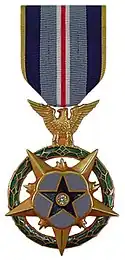 | |
| Type | Medal |
| Awarded for | "exceptionally meritorious efforts and contributions to the welfare of the Nation and mankind" |
| Country | United States |
| Presented by | the United States Congress |
| Eligibility | NASA astronauts |
| Status | Active |
| Established | September 29, 1969 |
| First awarded | October 1, 1978 |
| Total | 28 |
| Total awarded posthumously | 17 |
Congressional Space Medal of Honor ribbon | |
| Precedence | |
| Next (higher) | (none) |
| Next (lower) | NASA Distinguished Service Medal NASA Distinguished Public Service Medal |

The Congressional Space Medal of Honor was authorized by the United States Congress in 1969 to recognize "any astronaut who in the performance of his or her duties has distinguished himself or herself by exceptionally meritorious efforts and contributions to the welfare of the Nation and mankind".[1] It's awarded by the President of the United States in Congress's name on recommendations from the Administrator of the National Aeronautics and Space Administration. The award is a separate decoration from the Medal of Honor, which is a military award for extreme bravery and gallantry in combat.
While the Congressional Space Medal of Honor is a civilian award of the United States government, it is authorized as a non-military decoration for display on U.S. military uniforms because it is awarded by a federal agency. In such cases, the Congressional Space Medal of Honor is worn as a ribbon "immediately preceding the Prisoner of War Medal".[2] DoD policy specifically prohibits wear of any non-military awards for valor or service, but the Congressional Space Medal of Honor only recognizes meritorious achievement, so it does not fall under this prohibition.[3]
To be awarded the Congressional Space Medal of Honor, an astronaut must perform feats of extraordinary accomplishment while participating in space flight under the authority of NASA. Typically, the Congressional Space Medal of Honor is awarded for scientific discoveries or actions of tremendous benefit to mankind. The decoration may also be awarded for extreme bravery during a space emergency or in preventing a major space disaster, or posthumously to those astronauts who die while performing a U.S. space mission. As of 2022, all 17 astronauts killed on US missions had been awarded the medal.
President George W. Bush awarded the most CSMOH with 16; 14 of them posthumous for crews of the two destroyed space shuttle flights, Challenger and Columbia. President Joe Biden awarded the CSMOH to Crew Dragon Demo-2 members Doug Hurley and Bob Behnken on January 31, 2023. The 16-year hiatus from April 2006 to January 2023 is the longest gap between awards.
Recipients
The medal has been awarded to 28 astronauts, of which 17 were made posthumously for those who died preparing for or during an American spaceflight. Of those 17, three died in the Apollo 1 fire, seven died in the Space Shuttle Challenger disaster, and seven in the Space Shuttle Columbia disaster. Four of the twelve moonwalkers received the medal (Armstrong, Conrad, Shepard, and Young), but only Neil Armstrong for his lunar mission. The New Nine class of U.S. astronauts (the second group of astronauts selected by NASA) has the most recipients of the medal, with seven. Second is NASA Astronaut Group 8 which received five awards, four for astronauts killed in the Challenger Disaster (Shannon Lucid is the only Group 8 astronaut to receive the award who was not killed in the Challenger Disaster).
Seven recipients are living, four over 80 years old. Frank Borman was the last remaining of the first six recipients of the CSMOH in 1978.
In the table below, an asterisk indicates a posthumous award.
| Photo | Name | Date | Awarded by | Notes | Ref(s) |
|---|---|---|---|---|---|
 |
Neil Armstrong (1930–2012) | October 1, 1978 | Jimmy Carter | Apollo 11 (Commander of the first lunar landing, first man to walk on the Moon) | [1][4] |
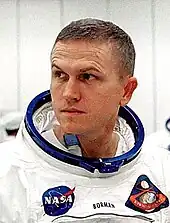 |
Frank Borman (1928–2023) | October 1, 1978 | Jimmy Carter | Apollo 8 (Commander of the first lunar orbit) | [1][5] |
 |
Pete Conrad (1930–1999) | October 1, 1978 | Jimmy Carter | Skylab 2 (first Skylab Commander; responsible for salvaging the critically malfunctioning station) | [1][6] |
 |
John Glenn (1921–2016) | October 1, 1978 | Jimmy Carter | Mercury-Atlas 6 (first American in orbit) | [1][7] |
_Grissom_portrait.jpg.webp) |
Gus Grissom* (1926–1967) | October 1, 1978 | Jimmy Carter | Mercury-Redstone 4, Gemini 3 (spacecraft commander of the first manned Gemini mission), Apollo 1 (spacecraft commander); died aboard Apollo 1 | [1][8] |
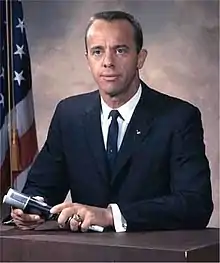 |
Alan Shepard (1923–1998) | October 1, 1978 | Jimmy Carter | Mercury-Redstone 3 (first American in space) | [1][9] |
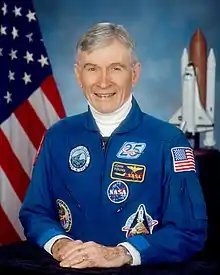 |
John Young (1930–2018) | May 19, 1981 | Ronald Reagan | Commander of STS-1, the first Space Shuttle mission | [1][10] |
 |
Thomas P. Stafford (1930–) | January 19, 1993 | George H. W. Bush | Apollo-Soyuz Test Project (U.S. Commander) | [1][11] |
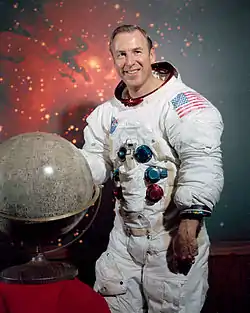 |
Jim Lovell (1928–) | July 26, 1995 | Bill Clinton | Apollo 13 (Commander of the ill-fated mission) | [1][12] |
 |
Shannon Lucid (1943–) | December 2, 1996 | Bill Clinton | Longest female spaceflight (passed by Sunita Williams) | [1][13] |
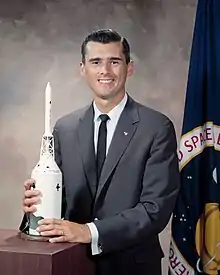 |
Roger Chaffee* (1935–1967) | December 17, 1997 | Bill Clinton | Died aboard Apollo 1 | [1][14] |
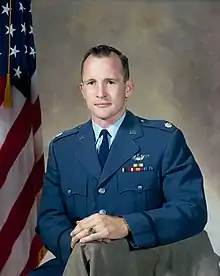 |
Ed White* (1930–1967) | December 17, 1997 | Bill Clinton | Gemini 4 (first U.S. space walk) and Apollo 1; died aboard Apollo 1 | [1][14] |
 |
William Shepherd (1949–) | January 15, 2003 | George W. Bush | Expedition 1 (first ISS Commander) | [1][15] |
 |
Rick Husband* (1957–2003) | February 3, 2004 | George W. Bush | STS-107 (died aboard Columbia) | [1][16] |
 |
Willie McCool* (1961–2003) | February 3, 2004 | George W. Bush | STS-107 (died aboard Columbia) | [1][16] |
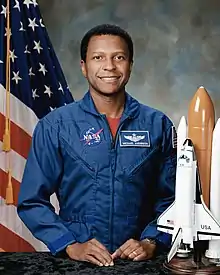 |
Michael P. Anderson* (1959–2003) | February 3, 2004 | George W. Bush | STS-107 (died aboard Columbia) | [1][16] |
 |
Kalpana Chawla* (1962–2003) | February 3, 2004 | George W. Bush | STS-107 (died aboard Columbia) | [1][16] |
 |
David M. Brown* (1956–2003) | February 3, 2004 | George W. Bush | STS-107 (died aboard Columbia) | [1][16] |
 |
Laurel Clark* (1961–2003) | February 3, 2004 | George W. Bush | STS-107 (died aboard Columbia) | [1][16] |
 |
Ilan Ramon* (1954–2003) | February 3, 2004 | George W. Bush | STS-107 (died aboard Columbia, only non-U.S. citizen recipient) | [1][17] |
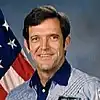 |
Dick Scobee* (1939–1986) | July 23, 2004 | George W. Bush | STS-51-L (died aboard Challenger) | [1][18] |
.jpg.webp) |
Michael J. Smith* (1945–1986) | July 23, 2004 | George W. Bush | STS-51-L (died aboard Challenger) | [1][18] |
.jpg.webp) |
Judith Resnik* (1949–1986) | July 23, 2004 | George W. Bush | STS-51-L (died aboard Challenger) | [1][18] |
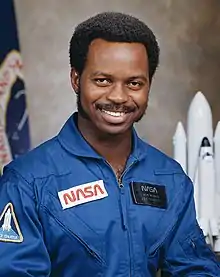 |
Ronald McNair* (1950–1986) | July 23, 2004 | George W. Bush | STS-51-L (died aboard Challenger) | [1][18] |
.jpg.webp) |
Ellison Onizuka* (1946–1986) | July 23, 2004 | George W. Bush | STS-51-L (died aboard Challenger) | [1][18] |
.jpg.webp) |
Gregory Jarvis* (1944–1986) | July 23, 2004 | George W. Bush | STS-51-L (died aboard Challenger) | [1][18] |
 |
Christa McAuliffe* (1948–1986) | July 23, 2004 | George W. Bush | STS-51-L (died aboard Challenger, teacher) | [1][18] |
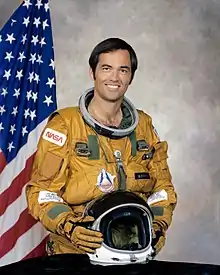 |
Robert Crippen (1937–) | April 26, 2006 | George W. Bush | STS-1 (first Space Shuttle flight, Pilot) | [1][19] |
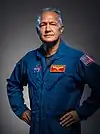 |
Doug Hurley (1966–) | January 31, 2023 | Joe Biden | Crew Dragon Demo-2 (first Astronaut crew into orbit aboard commercial vehicle, Commander) | [20] |
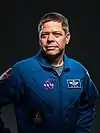 |
Bob Behnken (1970–) | January 31, 2023 | Joe Biden | Crew Dragon Demo-2 (first Astronaut crew into orbit aboard commercial vehicle, Pilot) | [20] |
See also
References
- 1 2 3 4 5 6 7 8 9 10 11 12 13 14 15 16 17 18 19 20 21 22 23 24 25 26 27 28 29 "Congressional Space Medal of Honor". NASA. April 28, 2006. Retrieved 2008-07-05.
- ↑ DoDI 1348.33, Dec. 21, 2016, Change 5, Apr. 9, 2021, Sec. 11: https://www.esd.whs.mil/Portals/54/Documents/DD/issuances/dodi/134833p.pdf
- ↑ DoDI 1348.33, Dec. 21, 2016, Change 5, Apr. 9, 2021, Sec. 11(a)
- ↑ Hubbard, Ben (August 2015). Neil Armstrong and Getting to the Moon. Capstone. ISBN 9781484625200. Retrieved 7 May 2017.
- ↑ "International Space Hall of Fame :: New Mexico Museum of Space History :: Inductee Profile". www.nmspacemuseum.org. Retrieved 7 May 2017.
- ↑ "International Space Hall of Fame :: New Mexico Museum of Space History :: Inductee Profile". www.nmspacemuseum.org. Retrieved 7 May 2017.
- ↑ "President Obama Awards John Glenn with Medal of Freedom - SpaceNews.com". SpaceNews.com. 4 June 2012. Retrieved 7 May 2017.
- ↑ "Gus Grissom: Remembering NASA's 'Forgotten' Astronaut". AmericaSpace. 2013-04-03. Retrieved 7 May 2017.
- ↑ "International Space Hall of Fame :: New Mexico Museum of Space History :: Inductee Profile". www.nmspacemuseum.org. Retrieved 7 May 2017.
- ↑ "National Space Grant Distinguished Service Award - 2007 | National Space Grant Foundation". www.spacegrant.org. Retrieved 7 May 2017.
- ↑ "Moon Rock to be Awarded to Apollo-Soyuz Astronaut Thomas Stafford". Space.com. 27 June 2005. Retrieved 7 May 2017.
- ↑ "Real-Life Apollo Astronaut Wins Medal". Pensacola News Journal. Pensacola, Florida. Associated Press. July 27, 1995. p. 2A – via Newspapers.com.
- ↑ "1st Woman Wins Space Medal of Honor". Los Angeles Times. Associated Press. 3 December 1996. Retrieved 7 May 2017.
- 1 2 "William J. Clinton: Remarks on Presenting the Congressional Space Medal of Honor Posthumously to Roger B. Chaffee and Edward H. White II". www.presidency.ucsb.edu. Retrieved 7 May 2017.
- ↑ "International Space Hall of Fame :: New Mexico Museum of Space History :: Inductee Profile". www.nmspacemuseum.org. Retrieved 7 May 2017.
- 1 2 3 4 5 6 Learning, Jones & Bartlett (2010). Exploring Space: The High Frontier. Jones & Bartlett Learning. ISBN 9780763789619. Retrieved 7 May 2017.
- ↑ "Ilan Ramon took tragic reminders, hope into space". AAAS - The World's Largest General Scientific Society. 10 June 2016. Retrieved 7 May 2017.
- 1 2 3 4 5 6 7 "Our SpaceFlight Heritage: 29th anniversary of Challenger disaster - SpaceFlight Insider". www.spaceflightinsider.com. 2015-01-28. Retrieved 7 May 2017.
- ↑ "Former astronaut Robert Crippen is honored". phys.org. Retrieved 7 May 2017.
- 1 2 "Former NASA Astronauts to Receive Congressional Space Medal of Honor". nasa.gov. 30 January 2023. MEDIA ADVISORY M23-011. Archived from the original on 2023-02-01.